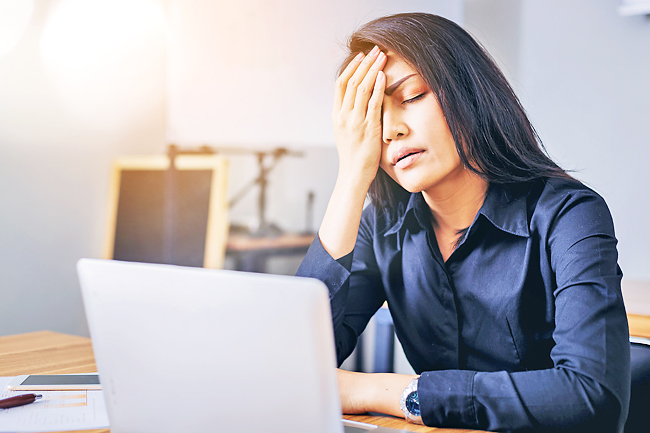CNA – It’s no longer surprising that people who work from home complain that they’re clocking in longer hours than before the pandemic.
The line between office and home is blurred, and we’ve all heard complaints about supervisors who don’t respect the sanctity of after-work hours. It also doesn’t help when bosses have been kickstarting each week with back-to-back Zoom meetings for the past two years now.
And with Omicron cases still on the high side, uninfected staff has to work even harder – whether onsite or from home – to pick up the slack left by COVID-19-positive colleagues. This particular observation has been noted by doctors such as senior consultant with Singapore General Hospital’s Occupational and Environmental Medicine Department Dr Lim
John Wah.
“The work tends to be delegated to the remaining employees, who are forced to either work extra hours in the office or bring work home,” he said.
“Some may feel like there is not enough time in the day to accomplish their tasks”; they are not “able to complete a to-do list” and they feel “like they are never able to keep up with the constant flow of additional work”, said Dr Lim.
Technology, which serves as a boon to modern living, has proven to be another bane during the pandemic. “Some employers expect their employees to be available at all hours of the day due to the convenience of technology,” he said.



MORE OVERWORKED PEOPLE
While “non-specific complaints such as gastric and bowel problems, muscle and joint pains” – which are signs of overworking – have not increased at the hospital level, it is more likely because patients typically address them at their family physician’s rather than at a tertiary healthcare level, opined Dr Lim.
Indeed, family doctors such as Dr Shimona Khoo from Raffles Medical have noticed an increase in the number of patients with such “symptoms suggestive of being burnt out”.
“Common complaints and signs include insufficient sleep or poor sleep quality, fatigue, feeling emotionally drained, poor mood, and increased irritability,” she said.
“Coupled with physical isolation, with little to no interaction with peers and colleagues, it is not surprising that one’s physical and mental health can deteriorate over time,” said Dr Khoo.
ARE YOU OVERWORKING OR JUST GETTING OLDER?
Just how detrimental to health is overworking? According to a joint paper published by the World Health Organization (WHO) and the International Labour Organization in 2021, three-quarters of a million people worldwide die from ischaemic heart disease and stroke brought on by long working hours. And by “long hours”, they mean longer than 55 hours per week.
The insidious thing about overworking is that the signs can be confused with getting older.
Can’t keep your eyes open after burning the midnight oil to rush out a report? You’re not a spring chicken anymore.
High blood pressure, increased cholesterol levels and weight gain? That’s all part and parcel of a dwindling metabolic rate caused by getting older, isn’t it?
“It is difficult to discern if the symptoms one experiences are due to overworking or are part of the natural ageing process,” said Dr Khoo. “For instance, longer working hours can result in poor sleep, insufficient time to exercise and binge eating, which lead to an increase in blood pressure, cholesterol and weight gain.”
Dr Lim also agreed: “It is not easy to differentiate these two, as there is an interlink between overworking and other common health issues”. However, “people who chronically overwork may experience these health issues earlier compared to their peers from the same age group”, he added.
WHY GOING ON LEAVE IS NOT ENOUGH
Well, you could go on leave and finally use up some of those days your boss has been reminding you to clear. But here’s the thing: Going on leave is only a temporary measure, said Dr Lim.
“When we return to the work environment that requires us to work long hours, the same problems tend to recur. It is best to target the underlying cause of overworking, instead of the symptoms of overworking,” he said.
Furthermore, not everyone can afford the luxury to take long breaks, such as two weeks, from work, said Dr Khoo. Or you may be busy with family commitments while on leave. Still, Dr Khoo said a short break here and there “is equally important” as it can provide a breather. “However, achieving work-life balance is the only way to address the health effects from overworking,” she said.
WHAT IS THE DAMAGE?
Working long hours induces your body to release excessive amounts of stress hormones, primarily cortisol, said psychologist Dr Adam Borland on the Mayo Clinic Website, which can lead to brain fog, high blood pressure and a host of other health problems.
“It’s like a car trying to run with a very limited amount of gas in the tank,” said Dr Borland.
“We’re expecting ourselves to perform physically and cognitively on such a high level but in reality, our reserves are tapped out.”
According to Dr Lim, overworking isn’t a condition that occurs overnight. It is a risk that “accumulates over the years” and “preventing it from becoming chronic may reduce the long-term complications of diseases associated with overworking”, he said.
Here’s a look at the damage that can happen to your health when you allow yourself to be chronically overworked and what you can do about it. However, if you experience prolonged insomnia, poor appetite, low mood, irritability, or develop suicidal thoughts, Dr Khoo strongly advises you to seek help early from a medical doctor.
Having enough sleep (at least seven hours per night) doesn’t only make you more alert and productive in the day. The lack of zzzs can also increase your risk of chronic diseases such as Type 2 diabetes and heart disease.
“From a preventive medicine perspective, we recommend people who work for long hours to go for a yearly health screening to detect risk factors for cardiovascular diseases, such as the ‘4 highs’: High blood pressure (hypertension), blood sugar (diabetes), cholesterol and BMI,” said Dr Lim.
For Dr Khoo, it is important to draw the distinction between work and home, so that your brain can switch off for the day. Simple routines to help you transition from “work you” to “home you” can be as easy as removing your contact lenses, changing into home clothes or taking a short walk in the park.
“When work is over, leave your workspace entirely and turn off all work-related devices,” she said. “As best as you can, avoid using your personal devices for work and reserve them solely for personal use only.”
Those stress hormones that your body keeps pumping out can take their toll on your vascular system and affect the heart and brain. “In a meta-analysis of 600,000 workers in the western world, those working 55 hours or longer were 23 per cent likelier to develop coronary heart disease. Additionally, the risk of stroke was elevated by 33 per cent,” said Dr Khoo.
Get moving (preferably aerobic exercise to increase your heart rate) to get those stress levels in control. Exercise increases your brain’s feel-good hormones known as endorphins and can reduce cortisol levels, according to the Mayo Clinic. If you can’t run, go for a walk around the neighbourhood before or after work. Walk to the coffeeshop a few blocks away to get your lunch instead of ordering online.







